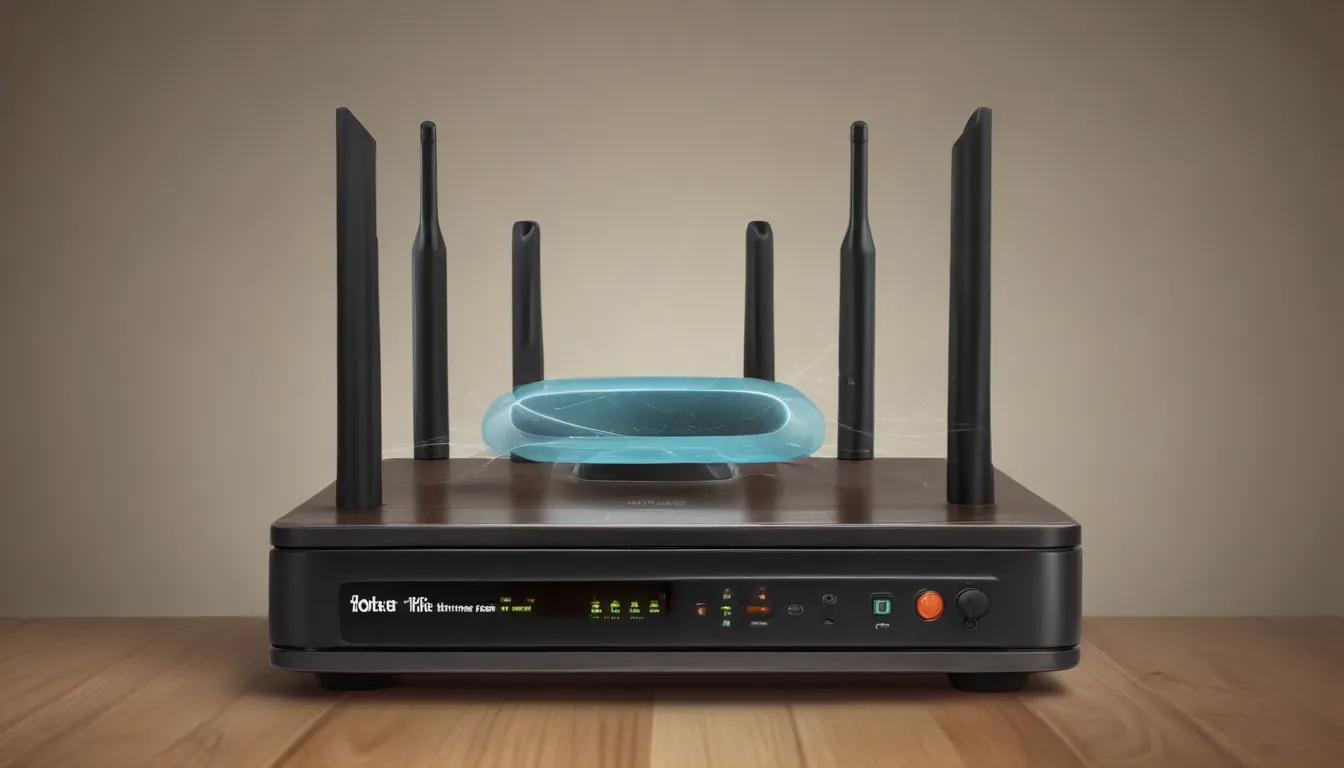A Note About Images: The images used in our articles are for illustration purposes only and may not exactly match the content. They are meant to engage readers, but the text should be relied upon for accurate information.
In our fast-paced, digital world, wireless routers are the unsung heroes quietly ensuring our online activities run smoothly. These unassuming devices play a crucial role in keeping our smartphones, laptops, and smart devices connected to the internet, allowing us to stream, work, and communicate effortlessly. Despite their ubiquitous presence, wireless routers hold a treasure trove of captivating facts that often go unnoticed. From their evolution over the years to the intricacies of their functionality, wireless routers possess a rich tapestry of information waiting to be unraveled. Join us on a journey as we explore 15 intriguing facts about wireless routers, shedding light on their impact, capabilities, and the technological marvels that underpin their operation. So, fasten your seatbelts as we delve into the world of wireless routers, unearthing insights that will transform the way you perceive these unassuming yet indispensable devices.
Key Takeaways:
- Wireless routers offer freedom and flexibility by connecting devices to the internet without physical cables, supporting various wireless standards for improved speed and security, and integrating with smart home devices for seamless connectivity.
- With advanced features like mesh networking for extended coverage, QoS prioritization for optimized online experiences, and voice control capabilities, wireless routers continue to evolve and shape the future of internet connectivity.
Wireless Routers Revolutionized Internet Connectivity
Wireless routers have become an integral part of modern internet connectivity, offering convenience and flexibility to users. Here are 15 fascinating facts about these essential devices:
Wireless Connectivity Without Physical Cables
Wireless routers enable devices to connect to the internet without the need for physical cables, providing freedom of movement and flexibility in device placement.
- Wireless routers have evolved to support various wireless standards, including 802.11n, 802.11ac, and the latest 802.11ax (Wi-Fi 6) standard, offering improved speed, range, and overall performance.
Enhanced Security Features
Modern wireless routers are equipped with advanced security features such as WPA3 encryption, firewall protection, and guest network capabilities, ensuring a secure and private browsing experience for users.
Dual-Band and Tri-Band Technology
Many wireless routers support dual-band and tri-band technology, allowing devices to connect to different frequency bands, reducing network congestion and optimizing performance for various applications.
Seamless Integration with Smart Home Devices
Wireless routers play a crucial role in powering smart homes, enabling seamless connectivity for smart devices such as thermostats, cameras, voice assistants, and smart appliances.
Mesh Networking for Expanded Coverage
Mesh networking technology allows multiple wireless routers to work together, creating a unified network that delivers extended coverage and eliminates dead zones within the home or office environment.
Quality of Service (QoS) Prioritization
Wireless routers feature Quality of Service (QoS) settings, enabling users to prioritize specific types of internet traffic, such as gaming or video streaming, for an optimized online experience.
Evolution of Gigabit Wi-Fi Speeds
The latest wireless routers support gigabit Wi-Fi speeds, delivering ultra-fast wireless connectivity for bandwidth-intensive activities such as 4K streaming, online gaming, and large file downloads.
Advanced Beamforming Technology
Many wireless routers utilize beamforming technology to optimize signal strength and improve Wi-Fi coverage, directing signals towards connected devices for enhanced performance.
Integration of Voice Control Capabilities
Some wireless routers integrate voice control capabilities, allowing users to manage network settings and perform functions using voice commands through virtual assistants like Amazon Alexa or Google Assistant.
Parental Control and Content Filtering
Wireless routers offer robust parental control features, empowering parents to manage internet usage, set content filters, and establish time restrictions to ensure a safe online environment for children.
Mobile App Management and Monitoring
With dedicated mobile apps, users can easily manage and monitor their wireless routers, enabling convenient access to network settings, security features, and device management from their smartphones or tablets.
Constant Evolution of Firmware Updates
Manufacturers regularly release firmware updates for wireless routers, introducing new features, enhancing security, and improving overall performance to ensure a reliable and secure networking experience.
Environmental Impact and Energy Efficiency
Wireless routers are designed with energy-efficient features to minimize environmental impact, incorporating power-saving modes and intelligent technologies to reduce energy consumption.
Integration of Advanced Network Ports
Many wireless routers feature advanced network ports, including Gigabit Ethernet and USB connections, facilitating high-speed wired connections and enabling the sharing of storage devices and printers across the network.
Wireless routers have truly revolutionized the way we connect to the internet, offering a myriad of features and capabilities that cater to the diverse needs of modern users. As technology continues to advance, wireless routers are poised to play an increasingly pivotal role in shaping the future of internet connectivity.
This comprehensive overview of 15 wireless router facts showcases the remarkable capabilities and advancements that have propelled these devices to the forefront of modern networking technology.
Conclusion
In conclusion, wireless routers are essential devices that play a pivotal role in modern connectivity. They enable seamless internet access, facilitate network sharing, and provide a gateway to a myriad of smart home devices. Understanding the various aspects of wireless routers, from their technical specifications to their security features, empowers users to make informed decisions when selecting the most suitable option for their specific needs. With the rapid advancements in technology, wireless routers continue to evolve, offering faster speeds, extended coverage, and enhanced security protocols. As the demand for reliable and high-performing wireless connectivity grows, staying abreast of the latest developments in wireless router technology is crucial for both consumers and businesses alike.
FAQs
-
What are the key factors to consider when choosing a wireless router?
When selecting a wireless router, it’s important to consider factors such as speed, range, security features, and the number of connected devices. Additionally, assessing the specific needs of your home or business, such as the size of the area to be covered and the types of devices that will be connected, is crucial in making an informed decision. -
How can I improve the performance of my wireless router?
To enhance the performance of your wireless router, you can consider positioning the router in a central location, updating its firmware regularly, minimizing interference from other electronic devices, and utilizing advanced features such as Quality of Service (QoS) to prioritize certain types of network traffic for a seamless user experience.
Wireless routers have transformed our digital lives, offering convenience and connectivity like never before. From revolutionizing internet access to seamlessly integrating with smart home devices, these powerful devices continue to evolve and shape our online experiences. As you explore the world of wireless networking, consider diving deeper into the realm of mobile connectivity with our informative article on the best mobile WiFi hotspots available today.






